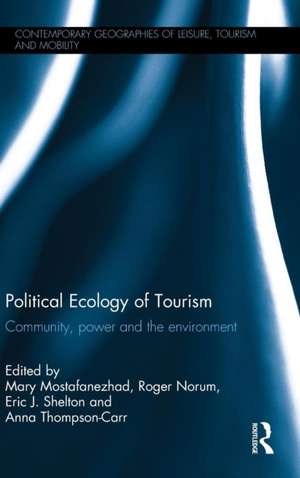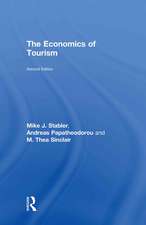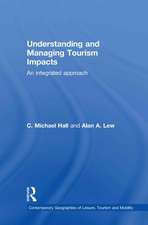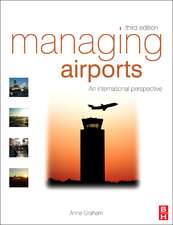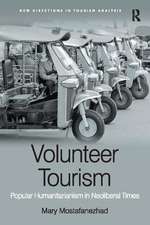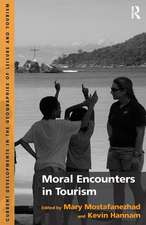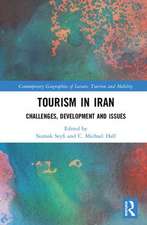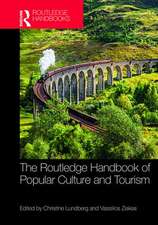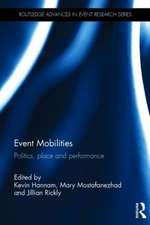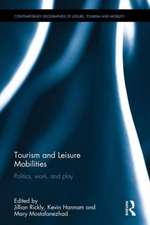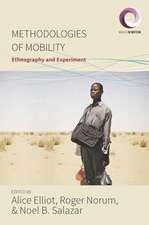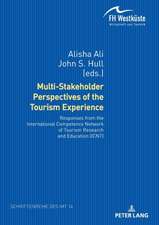Political Ecology of Tourism: Community, power and the environment: Contemporary Geographies of Leisure, Tourism and Mobility
Editat de Mary Mostafanezhad, Roger Norum, Eric J. Shelton, Anna Thompson-Carren Limba Engleză Hardback – 14 ian 2016
Drawing on recent trends in geography, anthropology, and environmental and tourism studies, Political Ecology of Tourism: Communities, Power and the Environment employs a political ecology approach to the analysis of tourism through three interrelated themes: Communities and Power, Conservation and Control, and Development and Conflict. While geographically broad in scope—with chapters that span Central and South America to Africa, and South, Southeast, and East Asia to Europe and Greenland—the collection illustrates how tourism-related environmental challenges are shared across prodigious geographical distances, while also attending to the nuanced ways they materialize in local contexts and therefore demand the historically situated, place-based and multi-scalar approach of political ecology. This collection advances our understanding of the role of political, economic and environmental concerns in tourism practice. It offers readers a political ecology framework from which to address tourism-related issues and themes such as development, identity politics, environmental subjectivities, environmental degradation, land and resources conflict, and indigenous ecologies. Finally, the collection is bookended by a pair of essays from two of the most distinguished scholars working in the subfield: Rosaleen Duffy (foreword) and James Igoe (afterword).
This collection will be valuable reading for scholars and practitioners alike who share a critical interest in the intersection of tourism, politics and the environment
| Toate formatele și edițiile | Preț | Express |
|---|---|---|
| Paperback (1) | 438.48 lei 43-57 zile | |
| Taylor & Francis – 25 apr 2018 | 438.48 lei 43-57 zile | |
| Hardback (1) | 1061.06 lei 43-57 zile | |
| Taylor & Francis – 14 ian 2016 | 1061.06 lei 43-57 zile |
Din seria Contemporary Geographies of Leisure, Tourism and Mobility
-
 Preț: 311.41 lei
Preț: 311.41 lei -
 Preț: 311.41 lei
Preț: 311.41 lei -
 Preț: 311.41 lei
Preț: 311.41 lei -
 Preț: 326.49 lei
Preț: 326.49 lei -
 Preț: 325.97 lei
Preț: 325.97 lei -
 Preț: 324.71 lei
Preț: 324.71 lei -
 Preț: 311.51 lei
Preț: 311.51 lei -
 Preț: 296.80 lei
Preț: 296.80 lei -
 Preț: 310.65 lei
Preț: 310.65 lei -
 Preț: 233.53 lei
Preț: 233.53 lei -
 Preț: 356.63 lei
Preț: 356.63 lei -
 Preț: 355.44 lei
Preț: 355.44 lei - 18%
 Preț: 1057.89 lei
Preț: 1057.89 lei - 18%
 Preț: 1057.40 lei
Preț: 1057.40 lei - 30%
 Preț: 850.91 lei
Preț: 850.91 lei - 18%
 Preț: 1165.73 lei
Preț: 1165.73 lei - 18%
 Preț: 1379.90 lei
Preț: 1379.90 lei - 18%
 Preț: 710.40 lei
Preț: 710.40 lei - 18%
 Preț: 1058.69 lei
Preț: 1058.69 lei - 18%
 Preț: 1222.85 lei
Preț: 1222.85 lei - 18%
 Preț: 1056.00 lei
Preț: 1056.00 lei - 18%
 Preț: 1220.63 lei
Preț: 1220.63 lei - 18%
 Preț: 1115.21 lei
Preț: 1115.21 lei - 18%
 Preț: 1056.00 lei
Preț: 1056.00 lei - 26%
 Preț: 765.43 lei
Preț: 765.43 lei - 18%
 Preț: 1055.51 lei
Preț: 1055.51 lei -
 Preț: 415.67 lei
Preț: 415.67 lei - 18%
 Preț: 1051.10 lei
Preț: 1051.10 lei -
 Preț: 416.26 lei
Preț: 416.26 lei - 18%
 Preț: 1223.21 lei
Preț: 1223.21 lei -
 Preț: 396.46 lei
Preț: 396.46 lei - 18%
 Preț: 1117.07 lei
Preț: 1117.07 lei - 18%
 Preț: 1056.35 lei
Preț: 1056.35 lei - 18%
 Preț: 1127.34 lei
Preț: 1127.34 lei - 18%
 Preț: 1062.62 lei
Preț: 1062.62 lei - 26%
 Preț: 822.54 lei
Preț: 822.54 lei - 18%
 Preț: 1119.16 lei
Preț: 1119.16 lei - 18%
 Preț: 1060.74 lei
Preț: 1060.74 lei - 26%
 Preț: 990.17 lei
Preț: 990.17 lei - 28%
 Preț: 848.98 lei
Preț: 848.98 lei - 18%
 Preț: 1336.32 lei
Preț: 1336.32 lei -
 Preț: 488.33 lei
Preț: 488.33 lei - 18%
 Preț: 1395.61 lei
Preț: 1395.61 lei - 26%
 Preț: 822.54 lei
Preț: 822.54 lei - 18%
 Preț: 1066.09 lei
Preț: 1066.09 lei
Preț: 1061.06 lei
Preț vechi: 1293.97 lei
-18% Nou
Puncte Express: 1592
Preț estimativ în valută:
203.04€ • 212.52$ • 168.99£
203.04€ • 212.52$ • 168.99£
Carte tipărită la comandă
Livrare economică 31 martie-14 aprilie
Preluare comenzi: 021 569.72.76
Specificații
ISBN-13: 9781138859449
ISBN-10: 1138859443
Pagini: 346
Ilustrații: 32
Dimensiuni: 156 x 234 x 25 mm
Greutate: 0.64 kg
Ediția:1
Editura: Taylor & Francis
Colecția Routledge
Seria Contemporary Geographies of Leisure, Tourism and Mobility
Locul publicării:Oxford, United Kingdom
ISBN-10: 1138859443
Pagini: 346
Ilustrații: 32
Dimensiuni: 156 x 234 x 25 mm
Greutate: 0.64 kg
Ediția:1
Editura: Taylor & Francis
Colecția Routledge
Seria Contemporary Geographies of Leisure, Tourism and Mobility
Locul publicării:Oxford, United Kingdom
Public țintă
PostgraduateCuprins
Introduction: Communities and Power Section 1: Communities and Power 1. A Gendered Political Ecology of Tourism and Water Stroma Cole 2. Ngarrindjeri Authority: A sovereignty approach to tourism Ron Nicholls, Freya Higgins-Desbiolles and Grant Rigney 3. Co-management of Natural Resources in Protected Areas in ‘Post-Colonial’ Africa Chengeto Chaderopa 4. “Few People Know that Krishna was the First Environmentalist”: Religiously Motivated Conservation as a Response to Pilgrimage Pressures in Vrindavan, India Tamara Luthy 5. Festive environmentalism: A carnivalesque reading of eco-voluntourism at the Roskilde Festival Mette Fog Olwig and Lene Bull Christiansen Section 2: Conservation and Control 6. Unsettling the Moral Economy of Tourism on Chile’s Easter Island Forrest Wade Young 7. Rethinking ecotourism in environmental discourse in Shangri-La: An antiessentialist political ecology perspective Jundan (Jasmine) Zhang 8. (Re)creating forest natures: assemblage and political ecologies of ecotourism in Japan’s central highlands Eric J. Cunningham 9. ‘Ecotourism or Eco-utilitarianism – exploring the new debates in Ecotourism Stephen Wearing and Michael Wearing Section 3: Development and Conflict 10. Political Ecologies and Economies of Tourism Development in Kaokoland, North-West Namibia Jarkko Saarinen 11. Cleaning Up the Streets, Sandinista-style: The Aesthetics of Garbage and the Urban Political Ecology of Tourism Development in Nicaragua Josh Fisher 12. The Political Ecology of Tourism Development on Mount Kilimanjaro Megan Holroyd 13. “Absolutely Not Smelly”: The Political Ecology of Disengaged Slum Tours in Mumbai, India Kevin Hannam and Anya Diekmann 14. Composing Greenlandic tourism futures: An Integrated Political Ecology and Actor-Network Theory Approach Carina Ren, Lill Rastad Bjørst and Dianne Dredge Conclusion: Meets, Routes and Leaves: Concluding thoughts on the intersection of tourism studies and political ecology Afterword Jim Igoe
Descriere
Drawing on recent trends in geography, anthropology, environmental and tourism studies, the chapters in this anthology employ a political ecology approach to the analysis of tourism development and impacts on the community and environment.
The volume begins by chronicling interdisciplinary perspectives on political ecology of tourism as well as how the subject has been treated in tourism studies to date. It addresses why political ecology has been given so little attention, despite the widespread consideration of the environment and politics in tourism studies. As the chapters in this anthology make clear, political ecologies of tourism are mediated by a range of political, economic and cultural relations of power. As a result of these relations, some ecological concerns are privileged while others are marginalized. This book advances our understanding of the role of political, economic and environmental concerns in tourism development and impacts on the community and environment. It offers the reader a critical and empirically grounded understanding of the contemporary relevance of political ecology to address tourism related issues such as power, uneven development, environmentalism, globalization and political economy.
This book will be valuable reading for those interested in the intersection of geography, anthropology and tourism studies.
The volume begins by chronicling interdisciplinary perspectives on political ecology of tourism as well as how the subject has been treated in tourism studies to date. It addresses why political ecology has been given so little attention, despite the widespread consideration of the environment and politics in tourism studies. As the chapters in this anthology make clear, political ecologies of tourism are mediated by a range of political, economic and cultural relations of power. As a result of these relations, some ecological concerns are privileged while others are marginalized. This book advances our understanding of the role of political, economic and environmental concerns in tourism development and impacts on the community and environment. It offers the reader a critical and empirically grounded understanding of the contemporary relevance of political ecology to address tourism related issues such as power, uneven development, environmentalism, globalization and political economy.
This book will be valuable reading for those interested in the intersection of geography, anthropology and tourism studies.
